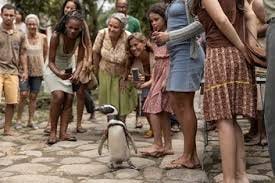My Penguin Friend stars the great Jean Reno as Joao, a fisherman living in a small coastal town in Brazil with his wife Maria (Adriana Barraza) and the memories of a long-ago tragedy that serves as the film’s prologue. One day, he happens to come across a penguin that was on its way to its breeding ground in Argentina when it got caught in a oil spill and plucks it from the ocean. He brings the bird home, cleans it up and it becomes a beloved figure in the area—even acquiring the nickname DinDim from a little girl—before leaving one day to head back to Argentina for mating season. That is not unexpected but what is unexpected is that six months later, DinDim makes the journey back to spend another half-year with Joao. DinDim continues to repeat this pattern over the next few years, becoming a media sensation when the story goes viral and attracting the attention of a research team who hope to understand exactly why he is doing this, even though the pursuit of this information might lead to him being permanently separated from Joao.
I confess that movies centered around animals have never held much interest to me—even as a small child, the misadventures of Benji would nearly paralyze me with boredom—but since I have an unabashed fondness for both penguins and Jean Reno, I nevertheless decided to give My Penguin Friend a shot, only to discover that I was a wiser child than I knew. The main problem is that while this does happen to be based on a true story, it isn’t based on an especially interesting one. The tale of a penguin going to great lengths to visit his human friend every year is nice enough but it is one that is more suitable for an “On the lighter side. . . segment at the end of a TV news broadcast on a slow day and screenwriters Kristen Lazarian and Paulina Lagudi Ulrich never figure out a way to stretch it into a compelling feature-length narrative. Both the narrative and the direction from David Schurmann are flat and flavorless—it spends its time trying to be inspirational when it should have been working on being interesting—and not even actors as skilled as the likes of Reno and Barraza can make much of the clunky dialogue supplied by Kristen Lazarian and Paulina Lagudi Ulrich. Sure, the penguins are cute and the results will probably be suitable for kids who are susceptible to the charms of seeing adorable animals get involved in mild misadventures. Viewers who do not succumb so easily to the sight of cute creatures, on the other hand, are likely to find My Penguin Friend to be more innocuous than insightful.
Skincare is also loosely inspired by a true story but if there any adorable animals involved in this debut feature from Austin Peters, they are probably being used to test the various products utilized by Hope Goldman (Elizabeth Banks), a celebrated L.A. aesthetician who is about to expand her empire by introducing her own line of skincare products to go along with her exclusive salon. Just as the line is ready to drop, Hope is shocked to discover that another skincare guru, the up-and-coming Angel (Luis Gerardo Mendez), has not just moved into the same shopping plaza but has the audacity to open his shop directly across from hers. The inevitable loss of clients and a spot on a local TV show to the newcomer is bad enough but tensions for Hope mount even further when someone appears to be deliberately targeting her and her business with a harassment campaign that includes hacked emails, slashed tires and fake ads soliciting people to show up at the shop for rough sex. Although Hope suspects that Angel is behind it all, she has no tangible proof to confirm those suspicions and when the cops fail to do much of anything, she enlists the aid of Jordan (Lewis Pullman), who has just arrived in town with dreams of becoming a life coach, to help her. Shockingly, things do not go entirely as planned and quickly and violently begin to spiral out of control.
The key problem with Skincare is that the screenplay, which Peters co-wrote with Sam Freilich and Deering Regan, is that it tries to do a lot of things with this particular setup but fails to do much of anything with them. At times, it wants to be an expose of the travails that women—even ostensibly successful ones like Hope—face when they have the audacity to try to make names for themselves in the world but the insights supplied are fairly shallow and facile. At other times, it wants to be an offbeat crime narrative of the sort that the Coen Brothers perfected in films such as Blood Simple and Fargo that combine absurdities, bloodshed and deadpan humor, but while the story is odd enough, the treatment is ultimately too flat to generate much working interest as things progress. It also tries to be a straightforward mystery as well but this doesn’t work either because a.) the pool of potential suspects (including the possibility that Hope is doing it all herself as a reaction to the pressure she is under) is so small that it won’t take viewers too long to figure it out and b.) the film itself makes the reveal so early in the proceedings that the whole thing begins to feel like an exercise than an involving story. What the film does have is the always-welcome presence of Elizabeth Banks in the central role and she is pretty entertaining throughout. However, not even her considerable efforts can do much to conceal Skincare’s increasingly obvious flaws.





